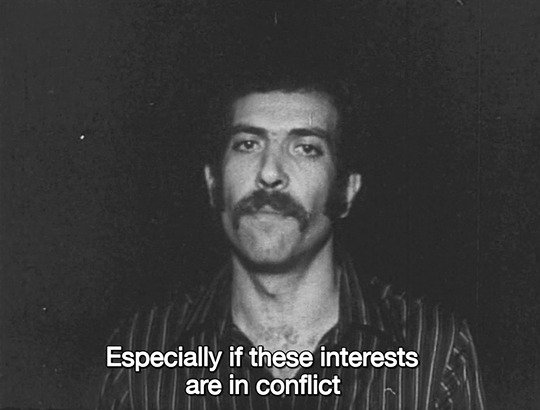#Global link
Text

Male Combee Dream World / Global Link PNG
0 notes
Text
















They Do Not Exist (1974) by Mustafa Abu Ali (watch)
from PalestineCinema.com:
Salvaged from the ruins of Beirut after 1982, Abu Ali's early film has only recently been made available. Shooting under extraordinary conditions, the director, who worked with Godard on his Ici et Ailleurs (Here and Elsewhere), and founded the PLO's film division, covers conditions in Lebanon's refugee camps, the effects of Israeli bombardments, and the lives of guerrillas in training camps. They Do Not Exist is a stylistically unique work which demonstrates the intersection between the political and the aesthetic. Now recognised as a cornerstone in the development of Palestinian cinema, the film only received its Palestine premiere in 2003, when a group of Palestinian artists "smuggled" the director to a makeshift cinema in his hometown of Jerusalem (into which Israel bars his entry).
Abu Ali, who saw his film for the first time in 20 years at this clandestine event noted: "We used to say 'Art for the Struggle', now it's 'Struggle for the Art'"
#mustafa abu ali#they do not exist#they do not exist 1974#for the missing subs pls message me for the link. just got the yt version and the subs to sync!#palestinian cinema#documentary#screencaps#global struggle#resistance#palestine#jean luc godard#post#history
15K notes
·
View notes
Text
Prison-tech is a scam - and a harbinger of your future

If you'd like an essay-formatted version of this post to read or share, here's a link to it on pluralistic.net, my surveillance-free, ad-free, tracker-free blog:
https://pluralistic.net/2024/02/14/minnesota-nice/#shitty-technology-adoption-curve

Here's how the shitty technology adoption curve works: when you want to roll out a new, abusive technology, look for a group of vulnerable people whose complaints are roundly ignored and subject them to your bad idea. Sand the rough edges off on their bodies and lives. Normalize the technological abuse you seek to inflict.
Next: work your way up the privilege gradient. Maybe you start with prisoners, then work your way up to asylum seekers, parolees and mental patients. Then try it on kids and gig workers. Now, college students and blue collar workers. Climb that curve, bit by bit, until you've reached its apex and everyone is living with your shitty technology:
https://pluralistic.net/2021/02/24/gwb-rumsfeld-monsters/#bossware
Prisoners, asylum seekers, drug addicts and other marginalized people are the involuntary early adopters of every form of disciplinary technology. They are the leading indicators of the ways that technology will be ruining your life in the future. They are the harbingers of all our technological doom.
Which brings me to Minnesota.
Minnesota is one of the first states make prison phone-calls free. This is a big deal, because prison phone-calls are a big business. Prisoners are literally a captive audience, and the telecommunications sector is populated by sociopaths, bred and trained to spot and exploit abusive monopoly opportunities. As states across America locked up more and more people for longer and longer terms, the cost of operating prisons skyrocketed, even as states slashed taxes on the rich and turned a blind eye to tax evasion.
This presented telco predators with an unbeatable opportunity: they approached state prison operators and offered them a bargain: "Let us take over the telephone service to your carceral facility and we will levy eye-watering per-minute charges on the most desperate people in the world. Their families – struggling with one breadwinner behind bars – will find the money to pay this ransom, and we'll split the profits with you, the cash-strapped, incarceration-happy state government."
This was the opening salvo, and it turned into a fantastic little money-spinner. Prison telco companies and state prison operators were the public-private partnership from hell. Prison-tech companies openly funneled money to state coffers in the form of kickbacks, even as they secretly bribed prison officials to let them gouge their inmates and inmates' families:
https://www.motherjones.com/politics/2019/02/mississippi-corrections-corruption-bribery-private-prison-hustle/
As digital technology got cheaper and prison-tech companies got greedier, the low end of the shitty tech adoption curve got a lot more crowded. Prison-tech companies started handing out "free" cheap Android tablets to prisoners, laying the groundwork for the next phase of the scam. Once prisoners had tablets, prisons could get rid of phones altogether and charge prisoners – and their families – even higher rates to place calls right to the prisoner's cell.
Then, prisons could end in-person visits and replace them with sub-skype, postage-stamp-sized videoconferencing, at rates even higher than the voice-call rates. Combine that with a ban on mailing letters to and from prisoners – replaced with a service that charged even higher rates to scan mail sent to prisoners, and then charged prisoners to download the scans – and prison-tech companies could claim to be at the vanguard of prison safety, ending the smuggling of dope-impregnated letters and other contraband into the prison system.
Prison-tech invented some wild shit, like the "digital stamp," a mainstay of industry giant Jpay, which requires prisoners to pay for "stamps" to send or receive a "page" of email. If you're keeping score, you've realized that this is a system where prisoners and their families have to pay for calls, "in-person" visits, handwritten letters, and email.
It goes on: prisons shuttered their libraries and replaced them with ebook stores that charged 2-4 times the prices you'd pay for books on the outside. Prisoners were sold digital music at 200-300% markups relative to, say, iTunes.
Remember, these are prisoners: locked up for years or decades, decades during which their families scraped by with a breadwinner behind bars. Prisoners can earn money, sure – as much as $0.89/hour, doing forced labor for companies that contract with prisons for their workforce:
https://www.prisonpolicy.org/blog/2017/04/10/wages/
Of course, there's the odd chance for prisoners to make really big bucks – $2-5/day. All they have to do is "volunteer" to fight raging wildfires:
https://www.hcn.org/articles/climate-desk-wildfire-california-incarcerated-firefighters-face-dangerous-work-low-pay-and-covid19/
So those $3 digital music tracks are being bought by people earning as little as $0.10/hour. Which makes it especially galling when prisons change prison-tech suppliers, whereupon all that digital music is deleted, wiping prisoners' media collection out – forever (literally, for prisoners serving life terms):
https://www.eff.org/deeplinks/2018/08/captive-audience-how-floridas-prisons-and-drm-made-113m-worth-prisoners-music
Let's recap: America goes on a prison rampage, locking up ever-larger numbers of people for ever-longer sentences. Once inside, prisoners had their access to friends and family rationed, along with access to books, music, education and communities outside. This is very bad for prisoners – strong ties to people outside is closely tied to successful reentry – but it's great for state budgets, and for wardens, thanks to kickbacks:
https://www.prisonpolicy.org/blog/2021/12/21/family_contact/
Back to Minnesota: when Minnesota became the fourth state in the USA where the state, not prisoners, would pay for prison calls, it seemed like they were finally breaking the vicious cycle in which every dollar ripped off of prisoners' family paid 40 cents to the state treasury:
https://www.kaaltv.com/news/no-cost-phone-calls-for-those-incarcerated-in-minnesota/
But – as Katya Schwenk writes for The Lever – what happened next is "a case study in how prison communication companies and their private equity owners have managed to preserve their symbiotic relationship with state corrections agencies despite reforms — at the major expense of incarcerated people and their families":
https://www.levernews.com/wall-streets-new-prison-scam/
Immediately after the state ended the ransoming of prisoners' phone calls, the private-equity backed prison-tech companies that had dug their mouth-parts into the state's prison jacked up the price of all their other digital services. For example, the price of a digital song in a Minnesota prison just jumped from $1.99 to $2.36 (for prisoners earning as little as $0.25/hour).
As Paul Wright from the Human Rights Defense Center told Schwenk, "The ideal world for the private equity owners of these companies is every prisoner has one of their tablets, and every one of those tablets is hooked up to the bank account of someone outside of prison that they can just drain."
The state's new prison-tech supplier promises to double the amount of kickbacks it pays the state each year, thanks to an aggressive expansion into games, money transfers, and other "services." The perverse incentive isn't hard to spot: the more these prison-tech companies charge, the more kickbacks they pay to the prisons.
The primary prison-tech company for Minnesota's prisons is Viapath (nee Global Tel Link), which pioneered price-gouging on in-prison phone calls. Viapath has spent the past two decades being bought and sold by different private equity firms: Goldman Sachs, Veritas Capital, and now the $46b/year American Securities.
Viapath competes with another private equity-backed prison-tech giant: Aventiv (Securus, Jpay), owned by Platinum Equity. Together, Viapath and Aventiv control 90% of the prison-tech market. These companies have a rap-sheet as long as your arm: bribing wardens, stealing from prisoners and their families, and recording prisoner-attorney calls. But these are the kinds of crimes the state punishes with fines and settlements – not by terminating its contracts with these predators.
These companies continue to flout the law. Minnesota's new free-calls system bans prison-tech companies from paying kickbacks to prisons and prison-officials for telcoms services, so the prison-tech companies have rebranded ebooks, music, and money-transfers as non-communications products, and the kickbacks are bigger than ever.
This is the bottom end of the shitty technology adoption curve. Long before Ubisoft started deleting games that you'd bought a "perpetual license" for, prisoners were having their media ganked by an uncaring corporation that knew it was untouchable:
https://www.youtube.com/watch?v=VIqyvquTEVU
Revoking your media, charging by the byte for messaging, confiscating things in the name of security and then selling them back to you – these are all tactics that were developed in the prison system, refined, normalized, and then worked up the privilege gradient. Prisoners are living in your technology future. It's just not evenly distributed – yet.
As it happens, prison-tech is at the heart of my next novel, The Bezzle, which comes out on Feb 20. This is a followup to last year's bestselling Red Team Blues, which introduced the world to Marty Hench, a two-fisted, hard-bitten, high-tech forensic accountant who's spent 40 years busting Silicon Valley finance scams:
https://us.macmillan.com/books/9781250865878/thebezzle
In The Bezzle, we travel with Marty back to the mid 2000s (Hench is a kind of tech-scam Zelig and every book is a standalone tale of high-tech ripoffs from a different time and place). Marty's trying to help his old pal Scott Warms, a once-high-flying founder who's fallen prey to California's three-strikes law and is now facing decades in a state pen. As bad as things are, they get worse when the prison starts handing out "free" tablet and closing down the visitation room, the library, and the payphones.
This is an entry to the thing I love most about the Hench novels: the opportunity to turn all this dry, financial skullduggery into high-intensity, high-stakes technothriller plot. For me, Marty Hench is a tool for flensing the scam economy of all its layers of respectability bullshit and exposing the rot at the core.
It's not a coincidence that I've got a book coming out in a week that's about something that's in the news right now. I didn't "predict" this current turn – I observed it. The world comes at you fast and technology news flutters past before you can register it. Luckily, I have a method for capturing this stuff as it happens:
https://pluralistic.net/2021/05/09/the-memex-method/
Writing about tech issues that are long-simmering but still in the periphery is a technique I call "predicting the present." It's the technique I used when I wrote Little Brother, about out-of-control state surveillance of the internet. When Snowden revealed the extent of NSA spying in 2013, people acted as though I'd "predicted" the Snowden revelations:
https://www.wired.com/story/his-writing-radicalized-young-hackers-now-he-wants-to-redeem-them/
But Little Brother and Snowden's own heroic decision have a common origin: the brave whistleblower Mark Klein, who walked into EFF's offices in 2006 and revealed that he'd been ordered by his boss at AT&T to install a beam-splitter into the main fiber trunk so that the NSA could illegally wiretap the entire internet:
https://www.eff.org/document/public-unredacted-klein-declaration
Mark Klein inspired me to write Little Brother – but despite national press attention, the Klein revelations didn't put a stop to NSA spying. The NSA was still conducting its lawless surveillance campaign in 2013, when Snowden, disgusted with NSA leadership for lying to Congress under oath, decided to blow the whistle again:
https://apnews.com/article/business-33a88feb083ea35515de3c73e3d854ad
The assumption that let the NSA get away with mass surveillance was that it would only be weaponized against the people at the bottom of the shitty technology adoption curve: brown people, mostly in other countries. The Snowden revelations made it clear that these were just the beginning, and sure enough, more than a decade later, we have data-brokers sucking up billions in cop kickbacks to enable warrantless surveillance, while virtually following people to abortion clinics, churches, and protests. Mass surveillance is chugging its way up the shitty tech adoption curve with no sign of stopping.
Like Little Brother, The Bezzle is intended as a kind of virtual flythrough of what life is like further down on that curve – a way for readers who have too much agency to be in the crosshairs of a company like Viapath or Avently right now to wake up before that kind of technology comes for them, and to inspire them to take up the cause of the people further down the curve who are mired in it.
The Bezzle is an intense book, but it's also a very fun story – just like Little Brother. It's a book that lays bare the internal technical workings of so many scams, from multi-level marketing to real-estate investment trusts, from music royalty theft to prison-tech, in the course of an ice-cold revenge plot that keeps twisting to the very last page.
It'll drop in six days. I hope you'll check it out:
https://us.macmillan.com/books/9781250865878/thebezzle
#pluralistic#the bezzle#marty hench#books#prison-tech#scams#jpay#securus#minnesota#prisones#shitty technology adoption curve#drm#enshittification#kickbacks#corruption#private equity#viapath#global tel link#bribery#aventiv#disciplinary technology#fcc#predicting the present#carceral state
587 notes
·
View notes
Text





(GLOBAL-EXCLUSIVE) Jul 10th: Bloomed images for Globalstars’ (CN-KR-TWstars) 20th original scout, in collaboration with Shiguang Dailiren / Link Click, has been released.
This scout features 5* Tatsumi, 4* Chiaki and 3*s Hiiro + Tetora, and will be released on Jul 13th.
Participate in the linked event to also obtain a 4* Wataru!
#enstars#ensemble stars#link click#shi guang dai li ren#global exclusive#tatsumi kazehaya#chiaki morisawa#hiiro amagi#tetora nagumo#wataru hibiki
223 notes
·
View notes
Text
A ton of job postings might actually be fake
Article date: June 24, 2024
Article Blurb:
A new survey from Resume Builder revealed that 39% of hiring managers said their company posted a fake job listing in the past year.
The disheartening results show that among those who posted fake jobs, “approximately 26% posted one to three fake job listings, 19% posted five, 19% posted 10, 11% posted 50, 10% posted 25, and 13% posted 75 or more.”
The fake jobs ranged from entry-level roles to executive positions, said Resume Builder, which surveyed 649 hiring managers.
Companies said they are posting fake jobs for a laundry list of reasons, including to deceive their own employees.
More than 60% of those surveyed said they posted fake jobs “to make employees believe their workload would be alleviated by new workers.”
Sixty-two percent of companies said another reason for the shady practice is to “have employees feel replaceable.”
Two-thirds of companies cited a desire to “appear the company is open to external talent” and 59% said it was an effort to “collect resumes and keep them on file for a later date.”
-
Magz Note: Keep in mind this is of those (presumably majority U.S.) companies that *admitted* to posting fake jobs in anonymous survey, so could be higher. Many job seekers have realized the "ghost jobs" phenomenon of fake job listings (plus, job scams) and its increase in recent years.
#since this includes international remote jobs listings it does affect global#link post#o post#capitalism#sij#magz upload
102 notes
·
View notes
Text
thank you to @omigodyall for finding these stories from colton's girlfriend riley and her sister, of kyle and colton grilling in the late evening after the 500, in the midst of a thunderstorm
#colton herta#kyle kirkwood#andretti global#indy 500#riley flynn#FINALLY getting to finish this after work. wanted to post it in time for SOME people to have working links ig#godbless my phones screenrecord with audio capabilities#hertwood#video#its the phone flashlight for me. ALSO care pointed out that kyle has himself as his phone background. lol
126 notes
·
View notes
Text


♥︎
#frank iero#my chemical romance#mcr#barks global music explorer interview#gifs*#*#PLEASE watch the linked interview#because mikey ray and gerard are also all soooo fuckin gorgeous in it
82 notes
·
View notes
Text
the strike maybe over, but occupation is not! free palestine, keep fighting for ceasefire!
here is a post with more information from the strike, here you can donate and help to evacuate palestinians. i encourage everyone to do what they can <3

#free palestine#global strike#editing this but keeping it as my pinned for a while. might update the links but keep fighting and talking!
177 notes
·
View notes
Text

Articuno Dream World / Global Link PNG
#Articuno#Pokemon First Generation#pokemon red and blue#Three legendary birds#Global link#Dream World
0 notes
Text

SCREAMING
#rhett and link#global citizen festival#twitter#THIS PHOTO#MY JAW IS ON THE FLOOR#it's like a cover of an album#holy shit#also#link without glasses#???????#what is happening#fuck#and they're gonna be a part of global citizen festival in new york#and if i understand it correctly they're gonna be on a huge stage in the middle of central park#what the FUCK#my post
55 notes
·
View notes
Text



KEY (Body Rhythm, Music Bank Global Festival, 231215) [X]
#SHINee#Key#Kim Kibum#giffedbyme#member: key#era: hard#analook#dailyshinee#kpopccc#kpopstages#malegroupsnet#ultkpopnetwork#dailybg#So we were finally blessed with this performance#Leaving the link :D#Body Rhythm spam incoming :))#Body Rhythm#Music Bank Global Festival
138 notes
·
View notes
Text
Jenissa Sullivan (ancestral_memory)
Trinidad & Tobago's Carnival has always embodied creative resistance and radical joy as protest, since the first days our African ancestors used masquerade as social critique and as an expression of resilience.
•
So, we stand in solidarity with all oppressed people of the global South!
#chromatic voice#free palestine#trinidad carnival#solidarity#global south#trinidad and tobago#jenissa sullivan#no one is free until we are all free#massa day done#ty to ceeturnalia for linking this to me! <3 <3
119 notes
·
View notes
Text
I know I run a fandom blog, but I can't in good consciousness not talk about what's happening in Brazil.
Rio Grande do Sul, my home state, is underwater. The floods are reaching 9 meters in height. Over 74 thousand people are now homeless, and over 300 cities out of the 497 cities in the state are in critical condition. In marginalized cities, the gangs are demanding to be paid to save people. There are 74 confirmed deaths, but that number will grow exponentially once the water is low enough that we can actually see the bodies-- the estimate for right now is over 1000 deaths. This tragedy will become a yearly event because of the utter incompetence of our governor and our president. There are multiple hospitals filled with people who needed to be treated for hypothermia that got flooded and now the patients are stuck inside.
I'll leave below the information to donate money to the government, but if I find any links related to non-profit organizations I will be making other posts about it. If you're American, your donations would be even more important. 5 dollars is equivalent to 20 reais. That's enough to buy someone a meal, or a blanket, or clothes that aren't soaked in dirty river water, or most common medications.
If you have no money at all, please just spread the word. It will encourage other countries to send help our way because Brazil was entirely unprepared for this disaster. Ask your representatives to help us.
Civil Defense - Get updates on the situation
Donation instructions:
Euro Zone:
Bank Standard Chartered
Bank Frankfurt
Swift: SCBLDEFX
Account: 007358304
Dollar Zone:
Bank Standard Chartered
Bank New York
Swift: SCBLUS33
Account: 3544032986001
For both cases, you have to inform:
Code IBAN: BR5392702067001000645423206C1
Name: Associação dos Bancos no Estado do Rio Grande do Sul
CNPJ: 92.958.800/0001-38
#global news#brazil#rio grande do sul#donation links#aid#international politics#latin america#important#floods#natural disaster
91 notes
·
View notes
Text
guys can anyone recommend me some good c-drama, donghua or even manhua. I'm trying to learn Chinese and I want some recs so I can learn faster. I only know link click, fake slackers, global examination, Heaven official blesing, mdzs, allsaints street, and scumbag system. please help me, just drop down some recs.

#mdzs#heaven official's blessing#all saints street#cdrama#global examination#link click#donghua#manhua#aaaahhhhhhhhhhhhhh#please please please#please help#pls#god please#ughhhh#extra points if its queer
13 notes
·
View notes
Text

SIGAPBET Situs Slot Terpopuler di Indonesia !
• Login Dan nikmati Game Slot Terpopuler Di SIGAPBET .
• Berbagai metode pembayaran hadir untuk kemudahan proses deposit dan withdraw lebih cepat.
• Daftar Di SIGAPBET langsung, bisa memainkan semua game terbaik pilihan paling populer di Indonesia.
Download Aplikasi Dan Menangkan Game Di SIGAPBET Dengan Persentase RTP Kemenangan Sampai 96%

#sigapbet#sigapbet slot#link sigapbet#daftar sigapbet#alternatif sigapbet#sgpbet#sgpbet88#sigapbet88#rtp sigapbet#slot viral#sigapbet global#sigapbet asia
16 notes
·
View notes
Note
Nah, your mention of the teacup scene was honestly perfect, because, just like P-Z it just feels so weird, and just kinda pointless/disjointed.
Heckers, even the people I know who LIKE the story of totk, did not seem to like the teacup scene.
Also, if I can throw in: It felt like a scene that, in its idea, should have been in the DLC. Maybe actually focus on just Sonia and Rauru as people, instead of the weird "talking around the bush, your powers don't work, Link, and the other piddly talk."
Like in the botw DLC, the focus was more on a "slice of life" peek into the Champion's life. It's such a waste of main-story content, and literally established nothing new. Heck, I actually hate that scene because it's just such a lazy way for Rauru to find out who Link is, and then later tell Ganondorf about Link.
Additionally, while we're talking about disappoint scenes/bad writing. Zelda's "I didn't remember anything from being a Dragon." It was such a bad cop-out, and it annoyed me to no end. They didn't need to mention it, leave it up to the player to interpret if Zelda remembers, and what she might have remembered or forgotten. The way it gets dropped is also like a hard rock. Riju: "So how was it?" Zelda: "Lol idk, don't remember."
It's weird how you can put Botw-Zelda's sacrifice against Totk-Zelda's sacrifice, and Botw she just sacrificed a lot more, even though Totk really plays up the severity of the "Sacrificing yourself to become a dragon"-thing, only for it to just be the most overhyped McGuffin to get Zelda back into her time.
Hey, thanks for the follow-up!
Yeah, agreed. I have talked extensively about the dragon problem somewhere??? I'll try to find it. Here! Which is basically that even if I agree the dragon thing is super cool and powerful and visually jawdropping and emotionally something, it's... kind of not a lot of what it claims to be.
But in addition to that, you made me think of something else by having this comment; there are multiple times during voiced cutscenes specifically where lines are used (I say used because every voiced line costs *so much money* so producers will always beg you to keep them to a minimum) to reassure the player that nothing truly bad is happening.
The thing with Zelda telling you she doesn't remember her time as a dragon is a great example, but there are many more. The first time I actively noticed it was during the Sealing cutscene where Rauru dives in to put his hand in Ganondorf's uhh tender heart (and he steals his magic? I wish something was actually done with that it could have been great if Rauru was corrupting himself voluntarily or something), and there is a whole dialogue where Ganondorf goes "hahaha thousands of years will pass in the blink of an eye", which could be a way to just brush off Rauru's actions as negligeable, but could also be a way to minimize the toll of time taken on both of them the same way it did for Zelda, especially since they semi-turn to stone immediately after. There are a lot of dialogue bits that feel like they are here for damage control and reassure us that the nice things are nice and the bad things are bad (a lot of the gerudo Sage dialogue also reads like that to me as well).
But yes, in general, it is a game that is incredibly averse to consequences, which does a lot of harm to its narrative tension in my opinion.
#asks#tloz#totk critical#totk spoilers#ganondorf#zelda#when will my brain return from the imprisoning war...#just the fact that ganondorf being stopped by rauru is barely acknowledged by ganon also bugs me#like it doesn't change the energy of the scene at all#he goes wow cool you did that anyways see you all in a bit#and rauru then hypes up link like you will sooo die to death dude#and ganon is like interesting factoid ok goodnight#and I feel like ganondorf feeling angry about that at least a Little (like see him being semi-mad about it but trying to be smug)#(instead of being 100% just smug the same he was before)#would have helped with scene tension in my opinion#that is pretty flat right now (but that's a global problem there are very little emotional progressions happening)#thanks for the ask!
58 notes
·
View notes